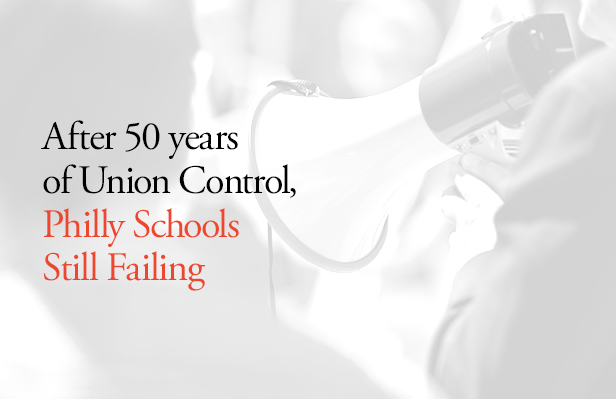Commentary

After 50 years of Union Control, Philly Schools Still Failing
Note: This commentary was first published in The Philadelphia Inquirer.
Academic failure, school violence, and financial mismanagement have been the dubious hallmarks of the School District of Philadelphia for decades. In that time, there has been one constant actor fighting tooth-and-nail to maintain the unacceptable status quo in Philadelphia’s education system: the Philadelphia Federation of Teachers.
This teachers’ union mouths support for democratic values and claims to be the voice for thousands of Philadelphia teachers—all without having earned, or even asked for, Philadelphia teachers’ votes.
Of the nearly 8,500 teachers currently in district schools, one single educator—a librarian—was working in the district in 1965 when the PFT last held a union certification election to become the exclusive representative for all district teachers.
By any standard, this is absurd and goes against the grain of foundational American values.
Fifty years ago, Lyndon Johnson was president and the Vietnam War was raging. About two-thirds of Americans alive today had not yet been born.
After all this time without the checks and balances provided by free choice and competition, it’s no surprise that the PFT has squelched innovation, resisted change, and sought to perpetuate its own power at any expense.
Let’s not forget the consequences of this union monopoly: Amidst the latest lawsuits, protests, tax-hikes, and budget battles lie thousands of broken academic dreams.
In 2013, 80 percent of Philadelphia’s students were not proficient in reading or math. In the same year, nearly 2,500 violent incidents occurred in district schools. Such an inhospitable learning environment motivated one-third of district students to flee to charter schools, which have at least some modicum of regulatory freedom to operate outside this broken system.
Rather than embracing public charters as a complement to district-run schools, PFT leaders chose a different approach: They’ve engaged in an endless campaign of negativity, pitting charter schools “against’ district schools in a zero-sum game that benefits no one—except the PFT.
Most recently, PFT President Jerry Jordan called for a moratorium on new charters—blaming these popular schools of choice for the district’s financial woes. This despite the fact that charters spend and receive less money per student than district schools. According to Jordan, “the argument for more school choice has no merit.”
Beyond school choice—which serves as a precious lifeline for tens of thousands of Philadelphia families seeking better, safer educational options—there are sensible policy changes that could reward, protect, and retain the district’s best teachers, but PFT leaders actively lobby against them.
Philadelphia schools are plagued by rigid seniority mandates, which leave some of the most talented, effective teachers at risk of being laid off in the event of furloughs. Yet PFT leaders claim “seniority is not the problem” and took legal action to protect the mandates. Union executives also oppose merit pay for the highest performing teachers, claiming that “better pay, not performance pay” is the answer.
Despite an increase of $1 billion in revenue over the last decade, PFT leaders repeatedly point to inadequate funding as an excuse for poor academic performance. Yet when the Commonwealth Court recently announced a ruling that will deny Philadelphia classrooms an estimated $200 million over the next four years, Jordan celebrated, declaring, “This is a very big victory.”
A victory for whom, exactly? Certainly not for students and families trapped in failing schools.
The priorities of Philadelphia’s teachers’ unions have always been suspect. There’s no better example than this: Randi Weingarten, American Federation of Teachers president, earns more than $550,000 per year.
Further, AFT used $500,000 in teachers’ dues not on professional development or to negotiate in teachers’ best interests, but to run political attack ads in Pennsylvania’s gubernatorial election. And on its website, PFT brags of turning out 2,000 members on Election Day and of “canvassing every Philadelphia neighborhood” in support of Gov. Tom Wolf.
How can partisan politics be the answer to Philadelphia’s education problems when governors, legislators, and dozens of elected officials of both parties have come and gone, yet the district’s downward spiral continues without an end in sight?
After 50 years of PFT’s unchallenged reign, Philadelphia’s students and poor families desperate for an escape from generational poverty are searching for help. It’s time to start looking somewhere else.
# # #
John Bouder is a senior communications officer and James Paul is a senior policy analyst with the Commonwealth Foundation (CommonwealthFoundation.org), Pennsylvania’s free market think tank.